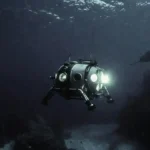Oceanic chemistry is a complex and dynamic field of study that explores the composition and chemical processes that govern the world’s oceans. This comprehensive exploration will delve into its profound significance, revealing the intricate chemical interactions beneath the surface and understanding how these processes impact our planet’s climate, marine life, and overall ecosystem.
The Significance of Oceanic Chemistry
Oceanic chemistry is not merely a scientific discipline but a critical lens through which we gain insights into the fundamental workings of our oceans, their role in the Earth’s systems, and their impact on global processes.
Elemental Composition
Oceanic chemistry enables us to decipher the elemental composition of seawater, revealing the concentrations of various elements and compounds dissolved within. Understanding this composition is crucial for assessing the health of marine ecosystems, studying nutrient cycles, and evaluating the availability of essential elements for marine life.
Climate Regulation
Oceanic chemistry plays a pivotal role in regulating the Earth’s climate. The ocean acts as a massive carbon sink, absorbing vast quantities of carbon dioxide from the atmosphere. By studying the ocean’s capacity to sequester carbon, we gain insights into climate change mitigation and the potential consequences of alterations in ocean chemistry.
Nutrient Cycling
Oceanic chemistry underpins nutrient cycling in marine ecosystems. Nutrients such as nitrogen and phosphorus are essential for the growth of phytoplankton, the base of the marine food web. Understanding nutrient dynamics is critical for predicting shifts in ocean productivity and the availability of seafood resources.
Chemical Processes in the Oceans
Many chemical processes shape the ocean’s composition and influence the fate of marine life beneath its surface. These processes encompass a wide range of reactions and interactions essential for the functioning of ocean ecosystems.
Ocean Acidification
Ocean acidification, driven by the absorption of excess carbon dioxide, is a pressing concern. Understanding this process is vital for assessing its impact on marine organisms, particularly those with calcium carbonate shells or skeletons, such as corals, mollusks, and some phytoplankton species.
Redox Reactions
Redox reactions, involving the exchange of electrons between chemical species, play a fundamental role in the ocean’s cycling of elements like oxygen and sulfur. These reactions impact nutrient availability and the distribution of microbial communities, which are crucial for marine ecosystem health.
Trace Element Cycling
Trace elements, including iron, manganese, and zinc, are present in minute quantities but exert significant control over various biological processes in the ocean. Understanding their cycling is essential for comprehending the factors that limit primary production and influence ecosystem dynamics.
Impact on Marine Life
Oceanic chemistry profoundly influences marine life, from the smallest phytoplankton to the largest marine mammals. Seawater’s chemical composition directly affects marine organisms’ growth, reproduction, and survival.
Coral Reefs and Calcifying Organisms
Oceanic chemistry impacts coral reefs and other calcifying organisms by affecting their ability to build and maintain calcium carbonate structures. As ocean acidification progresses, the health and biodiversity of these ecosystems are increasingly threatened.
Oxygen Minimum Zones
In oxygen minimum zones, where oxygen concentrations are exceptionally low, oceanic chemistry directly influences the distribution of marine species and shapes the biogeochemical cycles of elements like nitrogen. These zones are critical for understanding ecosystem dynamics in oxygen-depleted environments.
Harmful Algal Blooms
Chemical processes in the ocean can trigger harmful algal blooms, which produce toxins that can harm marine life and human health. Understanding the chemical factors driving these blooms is essential for managing their ecological and economic consequences.
Conservation and Ethical Considerations
As we delve deeper into the complexities of oceanic chemistry, conservation challenges, and ethical considerations emerge. Preserving the chemical balance of the oceans is essential for safeguarding marine ecosystems and the services they provide.
Ocean Pollution
Pollution from land-based sources can introduce contaminants and alter the chemical composition of seawater. Ethical considerations dictate the need for stringent regulations and responsible practices to minimize pollution and protect marine environments.
Sustainable Fisheries
Maintaining healthy ocean chemistry is vital for sustainable fisheries. Ethical fishing practices and conservation efforts are necessary to prevent overfishing and the disruption of marine food webs.
Ocean Exploration and Research Ethics
In our quest to explore and understand the oceans, ethical considerations must guide scientific research and exploration activities. Minimizing disturbances to marine ecosystems and preserving their chemical integrity is essential for responsible ocean exploration.
The Future of Oceanic Chemistry
Oceanic chemistry is poised for remarkable advancements to further our understanding of the chemical processes shaping the world’s oceans. The future promises challenges and opportunities for addressing the critical issues facing our marine environments.
Advanced Technology
Technological advances, including remote sensing, autonomous underwater vehicles (AUVs), and high-resolution analytical instruments, will revolutionize our ability to monitor and study oceanic chemistry. These innovations will provide unprecedented insights into ocean processes on both regional and global scales.
Climate Change Mitigation
Oceanic chemistry will play a crucial role in climate change mitigation strategies. As we better understand the ocean’s role in carbon sequestration, we can develop strategies to harness this capacity for carbon capture and mitigate the effects of climate change.
Sustainable Ocean Management
The sustainable management of oceanic chemistry will be a priority in the future. Global cooperation, ethical considerations, and conservation efforts will be instrumental in preserving the chemical balance of our oceans and protecting the myriad of ecosystems they support.
Conclusion
Oceanic chemistry is a multifaceted field that unveils the elemental balance of Earth’s seas, elucidates the impact of chemical processes on marine life, and addresses critical conservation and ethical considerations. As we peer into the intricate world of oceanic chemistry, we gain profound insights into the health and resilience of our oceans, the mitigation of climate change, and the preservation of marine ecosystems. Oceanic chemistry is an essential discipline that guides our responsible stewardship of the world’s oceans, ensuring their sustainability and the well-being of future generations.





